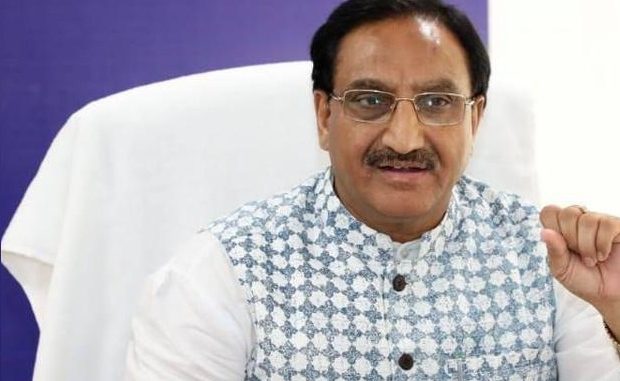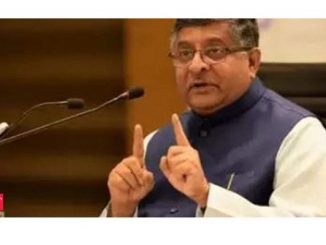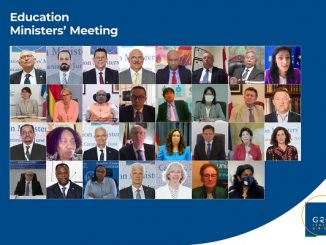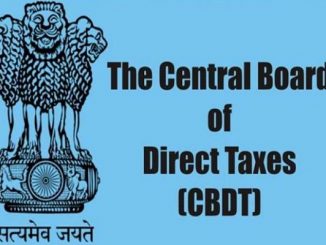
June 29: The Finance Commission headed by Chairman, Shri N. K. Singh today held a detailed meeting with the Ministry of Human Resource Development (MHRD) in which the Minister for HRD. Shri Ramesh Pokhriyal ‘Nishank’ , MOS (MHRD), Shri Sanjay Dhotre and all senior officials of the Ministry were present. The meeting was called to discuss the impact of the new tools of pedagogy, including online classes and use of other technology for Education, the need for which have arisen out of the ongoing pandemic. The Commission also had a detailed discussions with the Department of School Education & Literacy and Department of Higher Education on the necessity of submission of a revised memorandum to the Finance Commission by the Ministry in the light of the recent developments in the sector.
The Commission had called for this meeting more specifically for the purpose of making its recommendations in its report for 2020-21 and 2025-26 on the subject of education specially in the time of COVID-19. In this regard, the Commission needed greater clarity on:-
- Measureable outcomes and interventions for pre-primary education under the draft National Education Policy and the time frame of implementation of the National Education Policy.
- Monitoring of the index of 7 monitors given by the Commission for providing incentives to the States by the Commission.
Quality outcome parameters for performance monitoring in education
for FC-XV’s award period
| S. No. | Indicator | Weight (%) |
| 1 | Average language score in Class 3 – Government and aided schools | 10 |
| 2 | Average mathematics score in Class 3 – Government and aided schools | 10 |
| 3 | Average language score in Class 5 – Government and aided schools | 10 |
| 4 | Average mathematics score in Class 5 – Government and aided schools | 10 |
| 5 | Average language score in Class 8 – Government and aided schools | 10 |
| 6 | Average mathematics score in Class 8 – Government and aided schools | 10 |
| 7 | Difference between transition rate of boys and girls rate from upper primary to secondary level | 40 |
- State-wise targets prepared by the Ministry on these 7 indicators of Education any preparatory measures prepared by the Ministry for the States to avail the incentives from 202-22 onwards.
The Commission took into consideration the initiatives taken by Government of India related to Education as Part of the Rs 20 lac crore fiscal stimulus package designed to fight Economic impact of Covid-19:
- Technology driven Systems Online Education during COVID
- SWAYAM PRABHA DTH channels to support and reach those who do not have access to the internet. 3 channels were already earmarked for school education; now another 12 channels to be added.
- Provision made for telecast of live interactive sessions on these channels with experts from home through Skype.
- Also, tied up with private DTH operators like Tata Sky & Airtel to air educational video content to enhance the reach of these channels.
- Coordination with States of India to share air time (4 hrs daily) on the SWAYAM PRABHA channels to telecast their education related contents.
- DIKSHA platform has had 61 crore hits from 24th March till date
- 200 new text books added to e-Paathshaala.
- Technology Driven Education with Equity post-COVID
- PM eVIDYA- A programme for multi-mode access to digital/online education to be launched immediately; consisting of:
- DIKSHA for school education in states/UTs: e-content and QR coded Energized Textbooks for all grades (one nation, one digital platform)
- One earmarked TV channel per class from 1 to 12 (one class, one channel)
- Extensive use of Radio, Community radio and Podcasts
- Special e-content for visually and hearing impaired.
- Top 100 universities will be permitted to automatically start online courses by 30th May, 2020.
- Manodarpan- An initiative for psychosocial support of students, teachers and families for mental health and emotional wellbeing to be launched immediately.
- New National Curriculum and Pedagogical framework for school, early childhood and teachers will be launched: integrated with global and 21st century skill requirements.
- National Foundational Literacy and Numeracy Mission for ensuring that every child attains Learning levels and outcomes in grade 5 by 2025 will be launched by December 2020.
In a presentation made by the Secretary, Department of School Education & Literacy, Ms. Anita Karwal, highlighted that the COVID-19 pandemic has caused an unprecedented public health emergency, effecting the school education also. This Department has initiated the following interventions for ensuring continuity of learning during the period of school closures:
- PM e-VIDYA – School education
- Digital learning through SWAYAM PRABHA TV Channels
- NIOS (National Institute of Open Schooling)
- e-Pathshala for Digital Books and e-Contents
- SWAYAM Portal
- Operation Digital Board
- National Repository of Open Educational Resources (NROER)
- Imagining & shaping digital education as long term learning strategy
- Provisioning of ICT facilities in all uncovered Upper Primary, Secondary and Sr. Secondary Government Schools.
- Incentivizing States to perform well.
- PGI developed by MHRD will be tool for assessing performance.
- Outcome indicators in PGI that measure learning outcomes ( 6 indicators) and girls’ transition to secondary level ( 1 indicator) may be used.
- Incentive based grants may be allocated to State which occupy the highest grade, and to three States which show the largest percentage improvement.
- For the purpose of the grading, the learning outcomes will be assessed at the school level with a third party. The Deptt. will involve the NITI Aayog in framing the modalities of the assessment.
The total projections for Department of School Education & Literacy is as below:
| S.No. | Particular | Requirement of Funds |
| 1 | Total revised projection for five years i.e. 2021-22 to 2025-26 as per RTE interventions | 4,62,827.39 |
| 2 | Additional funds for implementation of NEP 2020 | 1,13,684.51 |
| 3 | Sector Specific Grants (PGI setc.) | 5,000.00 |
| 4 | Provisioning of ICT facilities in 3.10 lakh govt. schools | 55,840.00 |
| Total | Grand Total of funds required | 6,37,351.90 |
Secretary, Department of Higher Education, Shri Amit Khare also made a presentation before the Commission in which he detailed the Changing Demographics and preparedness of India to make Global Comparisons in Higher Education, he detailed a number of Challenges and Reforms to Higher Education including increasing GER to reach 50 per cent by 2035, achieving Excellence through Autonomy by Graded Accreditation, Technology-driven Education including Online, Digital, Blended Mode of education, etc. The Department has proposed a number of Regulatory Reforms for Online Education.
The Department has made a projection to the Finance Commission for the award period of 2021-22 to 2025-26.
The Department of Higher Education has given the detailed of their financial requirement projections to the Commission. For the Department Education Quality Upgradation and Inclusion Programme (EQUIP), an amount of Rs. 1,32,559.9 crore in 5 years has been projected. The Department has further projected an amount of Rs. 2306.4 crore for the development of online courses/ programmes over 5 years. A requirements Rs. 60,900 crore over 5 years has been projected for making devices like laptop, tablets, mobiles, televisions, etc. available to students. The Department of Higher Education has projected a financial requirement after the implementation of EQUIP (2020-21 – 2025-26) is a total of Rs. 4,00,576.25 crore over the next 5 years.
The Commission had a detailed discussion on all the matters raised by the Ministry and has assured to look into each of them while making the final recommendation to the Government.
Source: PIB
Disclaimer: We donot claim that the images used as part of the news published are always owned by us. From time to time, we use images sourced as part of news or any related images or representations. Kindly take a look at our image usage policy on how we select the image that are used as part of the news.


